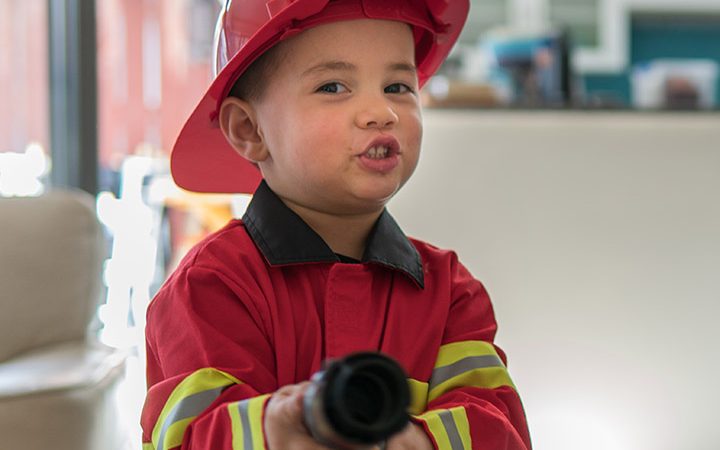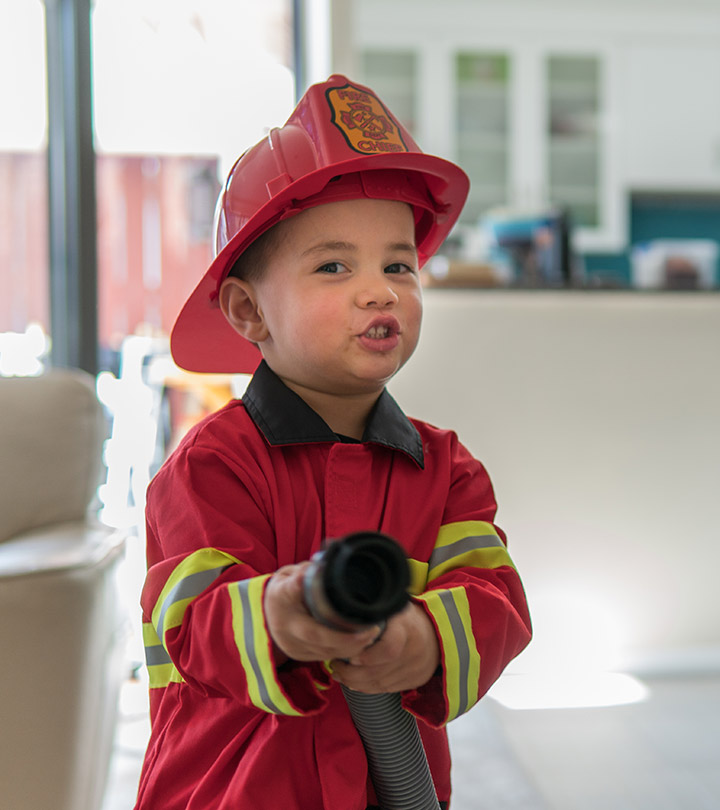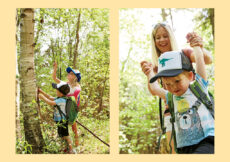Children can learn about fire safety from home. Learning about fire safety for kids is essential, and the best way to teach them about it is through examples. You may let your child watch you being cautious while cooking, heating, handling electrical units, and other potential fire hazards. Nevertheless, it is essential for children to know about things to do if they witness a fire breakout.
Read this post about the various aspects of fire safety for kids and some interesting fire facts for children.
20 Fire Safety Tips For Kids
According to the US Fire Administration, about 300 people are killed, and around $280 million worth of property is destroyed every year due to a child’s involvement with fire (1). A fire breakout can happen anytime and anywhere due to various reasons. It is important for children not to panic during a fire. You may follow and teach the following safety precautions to your child about fire safety (2) (3) (4).
1. Talk to your children about fire safety: Your children must know the dos and don’ts when around the fire. Give them safety instructions, such as avoiding playing with or placing combustible objects around the fire or electric cables. Do remind them of these instructions once in a while to reinforce them.
2. Be attentive and alert: Teach your child to be attentive to potential sparks and smoke, which might be the first signs of a fire. Being alert could avert major fire accidents, save lives, and prevent injuries.
3. Fireproof the house: Make sure all the electrical wiring in the house is sealed. It is advisable to set fire alarms and smoke alarms in the house and keep testing them periodically. You may also fireguard places where there are open fires or heaters.
4. Recognize the sound of alarms: Your child must be familiar with the sounds of fire alarms and know how to act and take necessary steps during a fire breakout.
5. Report to elders: Ask your child to report to you or any elder ones if they find any smoke or fire in the house. They should inform you when they find matches or lighters lying around.
6. Avoid placing things near the fire: Train your children to not place toys or any household items on heaters or kitchen tops. Ask your child to play at a safe distance from the fireplace.
7. Maintain distance: Heaters and stoves may cause serious burns in children. Keep your child at least three feet away from these. Never play with lighters or matches in front of your children as they may learn to repeat your actions.
8. Follow safety measures in the kitchen: Do not allow your children to indulge in playful activities in the kitchen, near the oven, or power sockets. Make sure to monitor your children in the kitchen while cooking.
9. Follow safety near the stove: Never ask your children to switch on or switch off the gas stove or ovens.
10. Avoid touching hot surfaces: Make sure your child stays away from hot cookers or saucepans in the kitchen or near the dining area.
11. Follow all safety measures with electricity: Always keep your children away from open and slit electrical cords or wires. Teach them not to touch any electrical appliances with wet hands or clothes. Older teens can be taught not to overload electric sockets with a power strip for plugging multiple devices. It may cause overheating and short circuits.
12. Unplug electrical appliances: Make sure to unplug all the electrical devices before you go to bed. Moreover, ask your children not to charge their cellphones, laptops, or other devices overnight or beyond the recommended charging time. Use plug guards in electric sockets to prevent younger children from placing their hands or sticking any object into the socket.
13. Practice firecracker safety: Keep monitoring your child while they are lighting firecrackers. Keep a safe distance and use long sticks to light a firecracker. Do not let them relight a cracker if it was not ignited the first time. Have a bucket of water or sand nearby in case a firecracker burns out of control.
14. Have an escape plan: Have a well-documented escape plan for evading during a fire accident. Teach your children about the emergency exit routes in the house and practice the fire drill plan at least twice a year to make them well aware of how to react in case of a fire.
15. Have clear paths for safe exit: The escape plan should have unblocked routes. Keeping all the exit routes clear will help in easy exit during a fire breakout.
16. Dress accordingly: Children should wear cotton clothes when dealing with firecrackers since these are less likely to catch fire easily. Additionally, you can teach them the technique of STOP, DROP, and ROLL if their clothes catch fire.
17. Keep all keys handy: Place all the keys near the respective doors and windows. It may save valuable time during a fire emergency by keeping all keys handy. Let your child be also aware of the keys, so that they may quickly exit themselves during an emergency.
18. Emphasize quick exit: Teach your children to make quick exits and stay out of the spot where a fire breaks out. Only professionally trained firefighters should enter the fire spot, even if there are valuable possessions inside the house.
19. Know the fire rescue contacts: Keep your child informed about the fire emergency contact numbers. It will be helpful if your child needs to call for help and rescue while you are away or stuck in a fire.
20. Follow vital safety measures for return: Teach your children that they should never return to a burning house or building under any circumstances. You may let them know the place, such as the neighbor’s house, where they may stay until the firefighters arrive.
Fire Facts For Kids
The importance of knowing fire facts and safety measures can help your children deal with a fire accident better. Here are a few facts about fire that children might want to know (3) (5) (6).
- Children below the age of five are more at risk of experiencing accidental fire injuries or death.
- Home fires account for approximately 90% of fire-related deaths.
- More than half of children who die in house fires would not have woken up to the fire alarms.
- Fires can spread rapidly (within two minutes) all over the house, making it imperative to respond to a fire alarm quickly.
- The temperature in rooms that are not yet on fire may cross 300°F (about 150°C). Therefore, it is important to move as far as possible from the fire.
- Having a smoke detector in proper working condition is useful for surviving a fire breakout.
- About 400 children below the age of ten die from home fires in a year.
Most children are fascinated by fire. However, parents and caretakers must be cautious when children are around a fire with this genuine interest. Teaching the child the safety measures and ways to respond during a fire are excellent ways of ensuring their safety during an emergency. Educating your children about fire facts may also help them realize that fire is not a toy, and it could be dangerous to play with it.
References:
MomJunction’s articles are written after analyzing the research works of expert authors and institutions. Our references consist of resources established by authorities in their respective fields. You can learn more about the authenticity of the information we present in our editorial policy.
The following two tabs change content below.




































